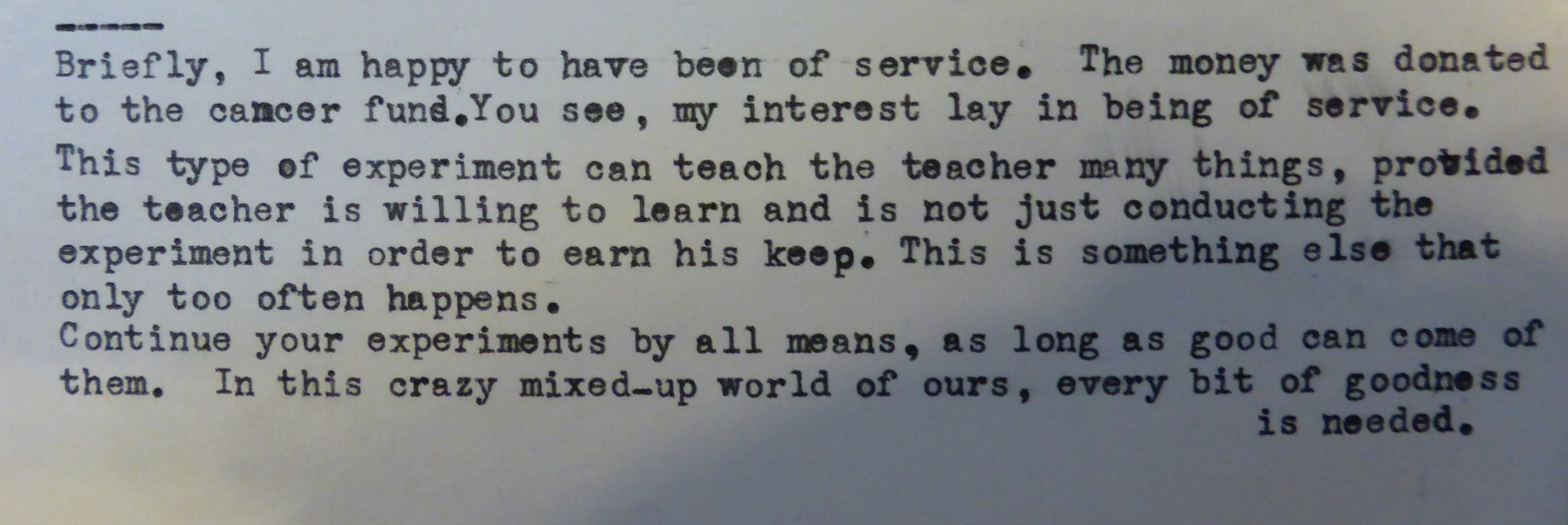News

In September 2014 we published three new papers related to our ongoing work on Milgram's 'Obedience to Authority' paradigm.
First, together with Art Miller (Miami U), we co-edited a special issue of the Journal of Social Issues to commemorate the 50th anniversary of the first publication of Milgram's research. This featured contributions from a range of Milgram scholars — not only social psychologists but also sociologists, film researchers, and historians.
The issue featured an introduction co-authored by the three of us (Reicher, Haslam & Miller, 2014). It also included an empirical paper co-authored with Megan Birney (Exeter U and St Andrews U) which developed a new paradigm that we used to test the effects of Milgram's various prods on participants' willingness to continue in an aversive task (Haslam, Reicher & Birney, 2104).
The results of this study showed that the prod that was most like an order (Prod 4: "You have no other choice, you must conttinue") was far less successful in encouraging participants to continue than the prod that enjoined them to contribute to a scientific goal (Prod 2 "The Experiment requires that you continue”).
The significance of this finding is that it challenges the idea that people are inherently programmed to follow orders (the lesson people typically draw from Milgram's studies). Indeed, it suggests that because orders violate the sense of shared identity upon which obedience — or, in our terms, engaged followership depends — they are likely to be counterproductive.
Providing further support for our engaged followership model, a major paper in the British Journal of Social Psychology co-authored with Kathryn Millard (Macquarie U) and Rachel McDonald (U of Kansas), delves into the Milgram archives at Yale to explore the psychology of Milgram's participants more closely (Haslam, Reicher, Millard & McDonald, 2014).
Previous discussion of participants' experience has focused on their level of distress, but we provide evidence that the most salient feature of participants’ responses – and the feature that most requires explanation – is not their lack of distress but their happiness at having participated.

A participant response card from the Milgram archive (from
which we derived the title of our BJSP paper). Note that the
participant construes his contribution as service in a good cause.
We argue that this 'happiness' was a product of the Experimenter’s ability to convince participants that they were contributing to a progressive enterprise — the advancement of scientific understanding. This supports our engaged followership model in suggesting (a) that willingness to perform unpleasant tasks is contingent upon identification with collective goals and (b) that leaders cultivate identification with those goals by making them seem virtuous rather than vicious (and thereby ameliorating the stress that achieving them entails).

![]()
to access our publications on Milgram's
'Obedience to Authority' research
Latest News
Consensus statement about the BBC Prison Study and the Stanford Prison Experiment
Response to new revelations about the Stanford Prison Experiment
New paper in Annual Review of Law and Social Science
Review paper examines new perspectives on Milgram paradigm
Screening of Shock Room at LSE
New publication on the ethics of prison studies